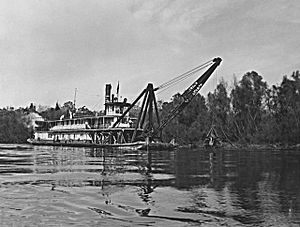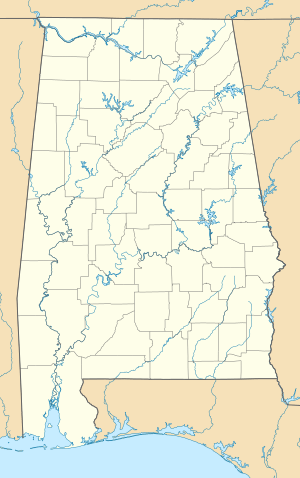Montgomery (snagboat) facts for kids

Montgomery on the Apalachicola River.
|
|
| History | |
|---|---|
| Builder | Charleston Dry Dock and Machine Company |
| Launched | 1925 |
| Out of service | November 8, 1982 |
| Status | Museum ship |
| General characteristics | |
| Length | 178 ft (54 m) LOA |
| Beam | 34 ft 3 in (10.44 m) |
| Depth | 6 ft (1.8 m) |
| Installed power | Steam |
| Propulsion | Sternwheel |
|
Montgomery (snagboat)
|
|
| Location | Pickensville, Alabama |
| Built | 1925 |
| Architect | Charleston Drydock & Machine Co. |
| NRHP reference No. | 83003521 |
| Significant dates | |
| Added to NRHP | November 28, 1983 |
| Designated NHL | June 30, 1989 |
The Montgomery is a special kind of boat called a snagboat. It uses steam power and a big wheel at the back to move. This boat was built in 1925 in Charleston, South Carolina. The United States Army Corps of Engineers used it to keep rivers clear.
The Montgomery worked hard for many years. It helped clear away snags and other things that blocked rivers. These rivers included the Coosa, Alabama, Apalachicola, Chattahoochee, Flint, Black Warrior, and Tombigbee Rivers. The boat stopped working for the Corps of Engineers on November 8, 1982.
After its working life, the Montgomery was fixed up in 1984 and again in 2004. It is one of only two snagboats left from the Army Corps of Engineers. The other one is the W.T. Preston. Because of its history, the Montgomery was named a National Historic Landmark in 1989. Today, you can visit the Montgomery as a museum ship. It is located at the Tom Bevill Lock and Dam Visitor Center in Pickensville, Alabama.
Contents
What is a Snagboat?
A snagboat is a special boat designed to remove "snags." Snags are things like fallen trees, logs, or other debris that get stuck in rivers. These snags can be dangerous for other boats. They can also block the flow of water.
Snagboats like the Montgomery have strong equipment to pull these obstacles out. This helps keep rivers safe and open for travel. It also helps prevent floods.
Building the Montgomery
The Montgomery is made mostly of steel. Its body is built from strong steel plates and a steel frame. The main part of the boat is about 156 feet (47.5 meters) long. With its big sternwheel at the back, it reaches about 178 feet (54.2 meters) in total length.
The boat is about 34 feet 3 inches (10.4 meters) wide. Its bottom is flat, and the front looks like a scow (a flat-bottomed boat). This design helps it work well in rivers. The Montgomery was built to be very strong. It needed to handle the tough job of pulling heavy snags.
How the Montgomery Worked
The Montgomery had special tools to do its job. It had a large boom at the front, supported by an A-frame. This boom could lift and move heavy objects. Steam-powered winches helped move the boom and pull snags.
The boat also had steam-powered capstans. These are like large spools that can pull ropes or cables. They helped keep the boat steady while it was pulling snags. The pilot house, where the captain steered the boat, was located on a deck above the engines.
A Special Museum Ship
Today, the Montgomery is a floating museum. Visitors can explore the boat and learn about its history. It teaches people about river navigation and the important work of the Army Corps of Engineers.
Being a National Historic Landmark means the Montgomery is a very important part of American history. It helps us remember how people kept our waterways safe for trade and travel.


